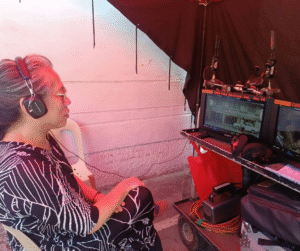
By Liezel Longboan and Jacob Delos Santos
Filipinos across the UK have voiced deep concern over the Labour government’s recently announced plans to tighten immigration rules. In a major policy speech on 12 May, Prime Minister Keir Starmer vowed to “take back control” of Britain’s borders and reduce net migration, signalling a dramatic shift in the country’s immigration stance.
Labour’s newly released white paper, Restoring Control Over the Immigration System, proposes sweeping reforms, chief among them a ban on the recruitment of overseas care workers. The government cites low domestic recruitment, poor sector pay, and worker exploitation as reasons behind the decision.
The news triggered heated discussion among Filipinos on Facebook groups and community forums. In response, Tinig UK hosted an online briefing via Facebook Live on 15 May to help unpack the white paper’s implications. The video has been watched by 3,900 viewers.
While the white paper remains under consultation and lacks a full implementation timeline, it lays out a stark shift in the UK’s immigration approach, prioritising high-skilled, high-wage labour and significantly tightening the eligibility criteria to study, work and settle in the UK.
Impact on Filipino healthcare workers
Filipinos working in health and social care will be among the hardest hit by these reforms, said Crystal Dias, an immigration solicitor and founder of Lawyery. Currently, 50,180 Filipino nurses and midwives are registered with the Nursing and Midwifery Council, making them the second largest group of international staff after India. Although there are no data available on Filipino carers, it is widely known that hundreds, if not thousands, work in adult social care across the sector.
With the impending ban on overseas carers, Dias asked, “Where are they going to get the workforce?” She said the Conservative government has been saying they need to train more people to work in the sector for the last 14 years and asked, “What’s happened to their plan?”
Jay Trondillo, a senior care home regional director and president of Filipinos in Care (FIC), echoed these concerns. “It will be interesting to see what sort of strategies that the government have in terms of supporting the sector. What investments are there? Are they proposing to increase training for people to come and have a career in care? Will there be funding?…What does that look like and what does the pay look like to encourage people to work in this industry?”
Trondillo said the association is monitoring the developments closely and will issue a formal response once there is more clarity. Filipinos in Care is a national association of Filipinos working in the adult care sector.
“A political move”
“I believe this is not a well thought-out set of policy changes. This is more of a political move,” said Edgar Jr Baylon, an employment rights advocacy officer at the Southeast and East Asian Centre (SEEAC). He believes that the policy is divisive, with people being labelled as low-skilled or high-skilled.
Baylon said that the government needs to support vulnerable workers. “Migrant workers experience all forms of abuses and oftentimes because of the lack of safeguards and the support from the government,” he said.
Are they proposing to increase training for people to come and have a career in care? Will there be funding?…What does that look like and what does the pay look like to encourage people to work in this industry? – Jay Trondillo, President of Filipinos in Care
During the briefing, an attendee named Pauline remarked: “The government is going after those that are easier to control to show UK voters that they’re doing something about immigration. The real issue in the UK public’s mind is the boats coming from across the channel, and the government is struggling to control that. What they’re doing with the white paper is a dead cat.”
In public relations (PR), “dead catting” is a distraction technique aimed to divert people’s attention from an issue by releasing alternative, often amusing, stories to the media.
Analysts say that Labour’s tough stance on immigration is a response to Reform UK’s success at the recent local elections. But while Labour attempts to court Reform voters, the latest YouGov’s polls suggest that it’s losing support among traditional Labour voters, who are now switching to the Liberal Democrats and Greens.
Stay informed and engaged
Despite the more challenging outlook, panellists agreed that the proposed changes are merely plans until approved and ready to be implemented. They urged the audience to stay on top of the news.
Jay Trondillo hopes that things can still change. “For example, in 2015, the government exempted the nurses from the 35K ILR (indefinite leave t remain) income threshold after a strong backlash from the NHS and the unions. Also, the care workers were added to the shortage occupation list after lobbying by the care providers during the COVID-19 recovery.
“And just last year, the initial ban on dependents for care workers was softened with an in-country switching exemption. So surely, as a community, we have our say here as a stakeholder, and even media and public opinion have successfully changed this based on precedents. So there’s something that can do.”
What migrants can do now
“You can’t control policy, but you can control your response,” said Crystal Dias. She advised the audience to prepare for possible changes and “future-proof” themselves. Here’s her advice:
- Secure your status early: Renew visas or apply for indefinite leave to remain (ILR) before new rules take effect.
- Upskill: Take UK-accredited qualifications to meet new RQF levels.
- Prepare for language tests: new rules may require B1 and B2 English levels for both workers and their dependents.
- Rely on trusted sources: Follow the UK Home Office, accredited immigration advisers, trusted news and information sources
- Be engaged. Write to your MPs and give your position on this issue.
“We need to make our voices heard,” said Edgar Baylon of SEEAC. “So if they are saying a lot of things against migration and we remain silent about this and we don’t give our own ideas about this issue, then…they will think that this is actually true.”
About the author

Jacob Delos Santos is a master’s student at SOAS, University of London. Originally from Marikina City, he now lives in Oxfordshire, working in medical advertising at IPG Health.
Beyond journalism, Jacob enjoys anime, swimming, and cooking vegan Asian dishes. His favorite fruit? Fresh mangoes from his family’s province in Zambales.












